Miscellaneous
Polis confident ENDA would pass House
Colorado Dem says Republicans have assured him they’ll back pro-LGBT bill
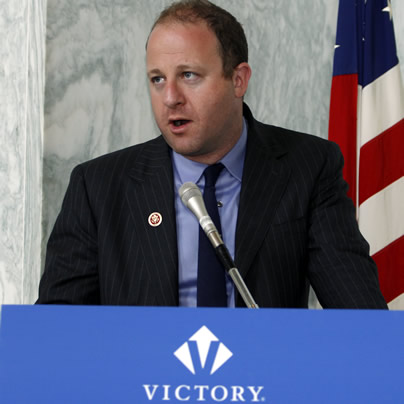
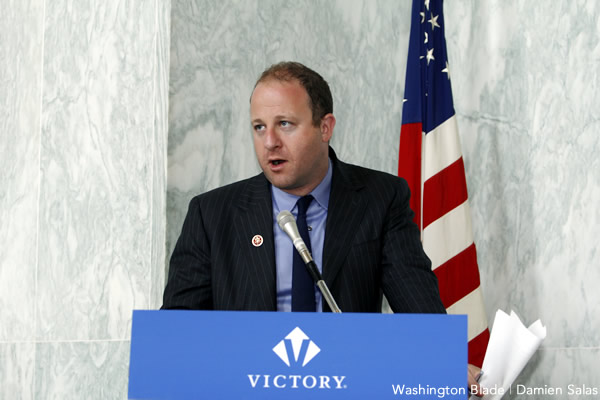
Rep. Jared Polis (D-Colo.) says he’s “confident” the House would pass ENDA if it came up for a vote (Washington Blade photo by Damien Salas).
The champion of the Employment Non-Discrimination Act in the U.S. House is joining the choir of those who assert that the bill would pass — if Speaker John Boehner (R-Ohio) allows it to come to the floor.
Rep. Jared Polis (D-Colo.), who’s gay and co-chair of the LGBT Equality Caucus, predicted during an interview with the Washington Blade Friday that ENDA would pass the House and said the next step for the bill is to pressure Republican leaders to bring it to the floor. He added that a number of undeclared Republicans have privately told him they’d vote “yes.”
“The next step is, of course, to continue to apply pressure to the speaker and the majority leader to bring it to the floor, where I’m confident it has enough support to pass,” Polis said. “The best way to do that is to demonstrate it has that support and continuing to add co-sponsors, particularly more Republican co-sponsors to ENDA so that we can have a stronger case to make that we need to bring it before the House to the floor for a vote.”
Although he acknowledged that the House has 13 months remaining in the current congressional calendar, Polis said “it would be nice to act sooner” because as Election Day draws near in November 2014, lawmakers will spend less time in Washington.
Polis said his assessment that the House would pass ENDA is based on the 10 Republicans in the Senate who joined all 54 Democrats present in voting for the measure on Thursday. ENDA would prohibit most employers from discriminating against LGBT workers.
“Slightly less than a quarter of Republicans in the Senate voted for it,” Polis said. “That would be similar in the House. About 20 percent of the Republicans would vote for it, which would give it the majority it needed to pass. A number of Republicans have told me on the floor they would vote for it; they’re not ready to add their name as co-sponsors. But they’re strongly supportive of this direction.”
Polis envisions that the House would pass ENDA with “between 20 and 40 votes — possibly more,” which he said was along the lines of the margin for House passage of the Violence Against Women Act reauthorization earlier this year. That bill, which included explicit protections for LGBT victims of domestic violence, passed the House in February by a 286-138 vote.
“I think [ENDA] would win by a sizable majority in the House as the Violence Against Women Act did, which included gays and lesbians,” Polis said. “I’m confident that it would pass by that margin.”
According to the Polis, the best way to pressure Republicans to bring ENDA to the floor is the continued growth of co-sponsors for the bill.
“We have 5 Republican co-sponsors and gaining 20 or more is the best way to pressure Republican leadership to bring ENDA up for a vote,” Polis said.
Reps. Terry Sewell (D-Ala.) and Hakeem Jeffries (D-N.Y.) both signaled this week they’re coming on board as co-sponsors, according to Polis’ office, bringing the total number of sponsors to 196. That’s just 22 votes short of 218 necessary to pass the legislation on the House floor.
By predicting that ENDA would pass the Republican-controlled House if it came to the floor despite the opposition stated by Boehner earlier this week, Polis joins others who’ve make similar predictions like Senate Majority Leader Harry Reid (D-Nev.) and the Human Rights Campaign. Speaking with the Washington Blade prior to the ENDA vote in the Senate, Sen. Jeff Merkley (D-Ore.), ENDA’s chief sponsor in that chamber, said the Senate-passed version of ENDA “would pass the House.”
Polis said the process for bringing the legislation to the floor would either be House leadership bringing the bill directly to the floor or regular order after a committee vote in the House Education & The Workforce Committee, but Polis said his preference is the former.
“It can go through committee as a House bill, in which case amendments would very likely be added that could change the bill, and it could pass the House, or, the preferred route, which is what we needed on the Violence Against Women Act, is we simply took up the Senate version under a closed rule with no additional amendments and passed it,” Polis said. “That would certainly be the easiest route to achieve a successful result.”
The Education & The Workforce Committee seems as opposed to bringing ENDA to the floor as Boehner is. Even after the calls from Polis and Rep. George Miller (D-Calif.) to hold a hearing on ENDA, the committee has remained silent and didn’t immediately respond to a request from the Washington Blade to discuss moving the bill following the Senate vote.
Asked if having 10 Senate Republicans vote for ENDA would encourage House Republicans to do the same, Polis emphasized public support for measures barring LGBT workplace discrimination, which one recent poll showed at 69 percent, would be the driving factor.
“I think there are some members of Congress who want to vote for it because their constituents want it and demand it,” Polis said. “There are gay and lesbian families across America, they want to know that they can’t be fired from their jobs because of who they love, and they let their members of Congress know that — Democrat or Republican. That’s why there’s such broad and immense support on the Democratic side and why it has increased on the Republican side.”
Polis was generally dismissive about ideas for workaround strategies to bring ENDA up on the House floor if leadership doesn’t act, but acknowledged a discharge petition is an option if “the normal process” doesn’t work.
“We’ll have to work with them to schedule it for consideration on the floor, or if the committee, the Education & The Workforce Committee, continues to refuse to schedule it, then there is that avenue available called the discharge petition,” Polis said. “It’s not one that often leads to success, that would be more a final attempt, if we’re unable to get it through the normal order.”
Asked whether inserting ENDA into a larger vehicle, such as the defense authorization bill, would be a strategy to consider, Polis maintained all options are on the table.
“We will look at all the legislative tactics available to us, including different vehicles that we can use to protect gay and lesbian Americans, including discharge petitions,” Polis said. “So, all the different legislative tactics under the rules of the House would be considered to move this important legislation forward.”
Polis, who became the first public official to call on President Obama to issue an executive order barring anti-LGBT workplace discrimination among federal contractors, said that option remains viable for the White House if the House Republican leadership refuses to bring up the bill.
“We want to protect all people in America, but if Congress is unable to accomplish that, I continue to advocate that the president should move forward to issue an executive order to ban workplace discrimination for federal contractors,” Polis said.
Polis called Michaud after coming out
Also during the interview, Polis addressed the recent announcement from Maine Congressman and Democratic gubernatorial candidate Mike Michaud that he’s gay. Polis said the news was a surprise to him.
“I had no idea, and called and congratulated him,” Polis said. “It must have been a heavy cross all these years, having to worry about who knew and who didn’t know. I’m sure it’s an enormous load off of his shoulders, and I think he’ll be an even more effective public servant — both in Congress and potentially as governor of Maine.”
The announcement from Michaud, who’s served in Congress since 2003, ends Polis’ distinction of being the most senior openly gay member of the U.S. House. The Colorado Democrat started serving his first term in 2009. Still, Polis remains the longest-sitting member of the House who has served in his seat while being openly gay.
Polis said he hasn’t yet discussed the possibility with Michaud about being a co-chair of the LGBT Equality Caucus as are other openly LGB members of the House, but suggested those conversations may happen when the House goes back into session next week.
“We’ve been in our districts, and I’ll be seeing him for the first time next week,” Polis said. “But when the news came out, I called and we had a nice conversation where I congratulated him and wished him well — and assured him I didn’t think this would be more than a couple days story and said I think people will respect his integrity and his honesty.”
Polis said he hopes Michaud’s announcement will inspire other gay members of Congress to come out.
“There’s not political reprecussions at all for people being honest about their orientation,” Polis said. “Hopefully, members of Congress who have chosen to hold that kind of information close will see that it’s simply easier to live an honest life and be honest with your constituents.”
Asked whether he knows of other closeted gay members of Congress, Polis said he hasn’t asked any of them about their sexual orientation.
“I’ve never asked,” Polis said. “Working with our colleagues, unless they bring it up, you really wouldn’t ask that kind of thing. And I certainly never discussed this before with Mike Michaud.”
Miscellaneous
LA-based TransLatin@ Coalition leads in time of attacks
Members of Congress ‘calling us a radical organization’
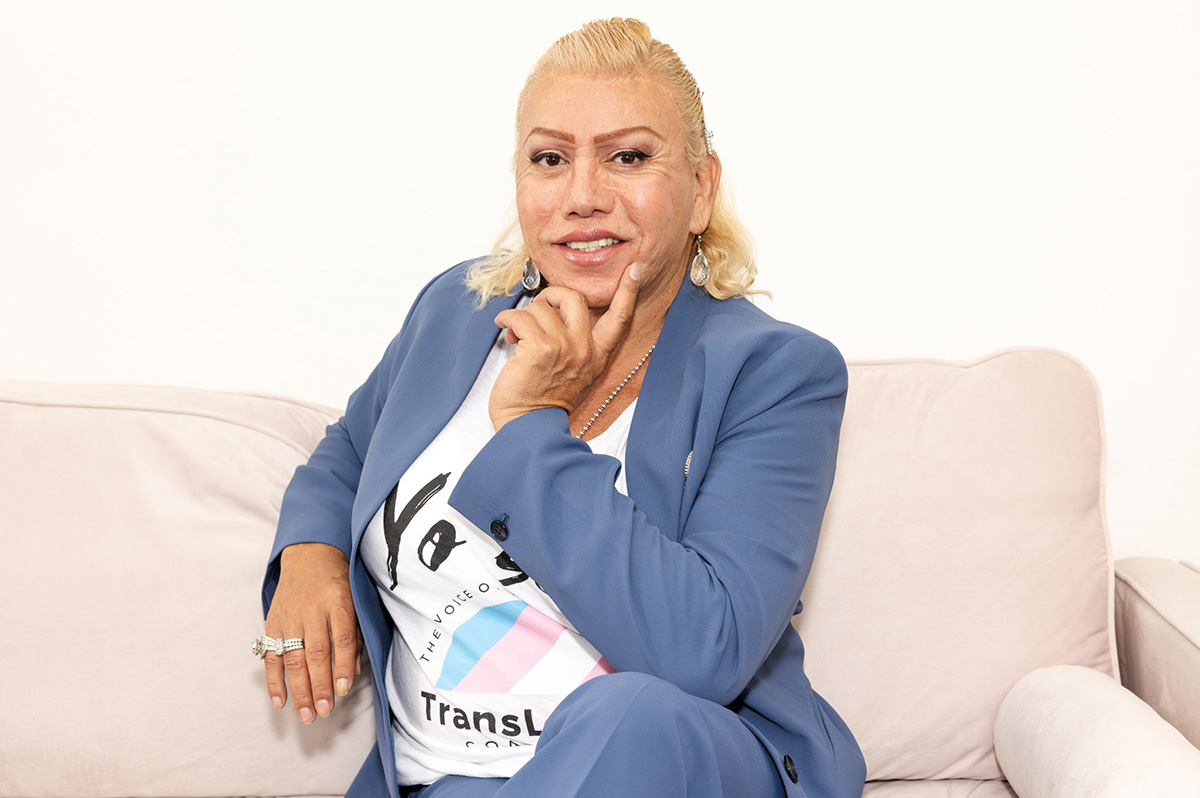
As ICE raids intensify across Southern California and anti-immigrant sentiment resurfaces in Orange County, transgender and immigrant communities are once again being targeted. These crackdowns go beyond enforcement — they’re designed to instill fear. At the same time, a coordinated right-wing smear campaign is attempting to discredit the very organizations working to keep these communities safe.
Last month, the TransLatin@ Coalition, a cornerstone in the fight for trans, queer, and immigrant rights in Los Angeles, was publicly named by members of Congress. But this was no recognition. It was a calculated attack.
“They’re calling us a radical organization,” said Bamby Salcedo, president and CEO of the TransLatin@ Coalition. “They’re spreading lies, saying we’re using government funding to abolish ICE and the police and to provide abortion access. We do believe in those things, but the funding we receive is used to serve our people.”
Now, that funding is being stripped away.
In the face of state violence, political backlash, and economic sabotage, TLC is responding the way it always has: by organizing, celebrating, and building a better world. Because when our communities are under attack, we show up — stronger, louder, and more united than ever.
Salcedo, herself a proud trans Latina immigrant, has spent decades fighting for those living at the margins. “I always say I am an intersection walking,” she said with a smile. “Our organization is made up of the people most impacted — and we are the ones leading the work.”
In Los Angeles County, roughly one-third of residents are immigrants, the majority of whom are Latino. Unsurprisingly, trans Latinas represent the largest segment within the local trans community.
Yet even within immigrant justice spaces, trans people are often sidelined.
“It’s a very hetero-centric space,” Salcedo said. “Most of the time, they don’t even consider the lives and experiences of trans and queer immigrants.”
The TransLatin@ Coalition is actively changing that. As a key member of a broad alliance of more than 100 immigrant-serving organizations across Los Angeles, including CHIRLA and the Filipino Workers Center, the TransLatin@ Coalition helped secure over $160 million in American Rescue Plan funds for immigrant housing, internet access, and legal services.
They also co-created the groundbreaking TGIE (Transgender, Gender-Nonconforming, Intersex Empowerment) initiative, which allocates $7 million in Los Angeles County’s annual budget to support trans-led service providers.
“We don’t just want symbolic policies,” said Salcedo. “We fight for resources. We analyze the budget. We make it real.”
Despite these victories, the TransLatin@ Coalition is now confronting devastating federal cuts.
“Our work has been defunded,” Salcedo said bluntly. “Multiple programs are gone. And we’re not alone — trans-led organizations across the country, especially in the South, are facing the same.”
She pointed to a broader backlash against anything associated with diversity, equity, and inclusion (DEI). “The private sector is pulling back. Philanthropy is scared. Even the same corporations that fund us during Pride are investing in our opposition the rest of the year. It’s hypocrisy.”
Rather than retreat, the TransLatin@ Coalition is calling for bold, collective action.
“Now’s the time for people to step up,” said Salcedo. “We have the strategy. We’re doing the work. But we need resources — and we need real solidarity, not just statements.”
To respond to the crisis and raise urgently needed funds, the TransLatin@ Coalition is organizing its Walk for Humanity on Saturday, Aug. 24. The event will begin at 9 a.m. in Silver Lake and march to Sunset and Western, featuring live performances, a resource fair, and a unified call for justice.
And yes — it will be joyful.
“This is a call for all people to stand in solidarity with one another,” said Salcedo. “We want to bring together 1,000 people, each raising $1,000. It’s going to be a beautiful day of community and resistance.”
In a surprise announcement, Salcedo also revealed she will debut her first single — a cumbia track inspired by the movement. “It’s about movement in both senses: our political movement, and moving our bodies,” she laughed. “We can’t let them take away our joy. Joy is how we survive.”
When asked what more local leaders can do, Salcedo didn’t hesitate. “Elected officials are public servants. That means serving all people,” she said. “We may be a small population, but we are deeply impacted — and we contribute so much to this city.”
She pointed to data from LA’s most recent homelessness count, which identified over 2,000 trans and gender-expansive people experiencing homelessness. That number exists thanks in large part to years of advocacy demanding the city count and name trans lives. “We have the data now. There’s no excuse not to invest in our people.”
She also uplifted allies like Los Angeles County Supervisor Lindsey Horvath and newly appointed City Council member Isabel Urado, the first openly LGBTQ person to hold her seat. “They’ve seen our work and are fighting to invest in it,” Salcedo said. “We’re hopeful we’ll see another $10 million in city funding. But we need the community behind us.”
At the end of our conversation, I asked Salcedo what she would say to undocumented, queer, and trans Angelenos who are feeling afraid right now.
Her answer was clear, powerful, and full of love:
“You are a divine creation. You deserve to exist in this world. Walk your path with dignity, love, and respect — for yourself and for others. You belong. You are part of me. You are part of us.”
If standing with trans immigrants, resisting federal rollbacks, and dancing in the streets sounds like your kind of solidarity, join the TransLatin@ Coalition on Aug. 24. Because when we show up together, we protect each other. And when we dance together — we win.
Watch the full interview with Salcedo:
Miscellaneous
The dedicated life and tragic death of gay publisher Troy Masters
‘Always working to bring awareness to causes larger than himself’

Troy Masters was a cheerleader. When my name was called as the Los Angeles Press Club’s Print Journalist of the Year for 2020, Troy leapt out of his seat with a whoop and an almost jazz-hand enthusiasm, thrilled that the mainstream audience attending the Southern California Journalism Awards gala that October night in 2021 recognized the value of the LGBTQ community’s Los Angeles Blade.
That joy has been extinguished. On Wednesday, Dec. 11, after frantic unanswered calls from his sister Tammy late Monday and Tuesday, Troy’s longtime friend and former partner Arturo Jiminez did a wellness check at Troy’s L.A. apartment and found him dead, with his beloved dog Cody quietly alive by his side. The L.A. Coroner determined Troy Masters died by suicide. No note was recovered. He was 63.
Considered smart, charming, committed to LGBTQ people and the LGBTQ press, Troy’s inexplicable suicide shook everyone, even those with whom he sometimes clashed.
Troy’s sister and mother – to whom he was absolutely devoted – are devastated. “We are still trying to navigate our lives without our precious brother/son. I want the world to know that Troy was loved and we always tried to let him know that,” says younger sister Tammy Masters.
Tammy was 16 when she discovered Troy was gay and outed him to their mother. A “busy-body sister,” Tammy picked up the phone at their Tennessee home and heard Troy talking with his college boyfriend. She confronted him and he begged her not to tell.
“Of course, I ran and told Mom,” Tammy says, chuckling during the phone call. “But she – like all mothers – knew it. She knew it from an early age but loved him unconditionally; 1979 was a time [in the Deep South] when this just was not spoken of. But that didn’t stop Mom from being in his corner.”
Mom even marched with Troy in his first Gay Pride Parade in New York City. “Mom said to him, ‘Oh, my! All these handsome men and not one of them has given me a second look! They are too busy checking each other out!” Tammy says, bursting into laughter. “Troy and my mother had that kind of understanding that she would always be there and always have his back!
“As for me,” she continues, “I have lost the brother that I used to fight for in any given situation. And I will continue to honor his cause and lifetime commitment to the rights and freedom for the LGBTQ community!”
Tammy adds: “The outpouring of love has been comforting at this difficult time and we thank all of you!”
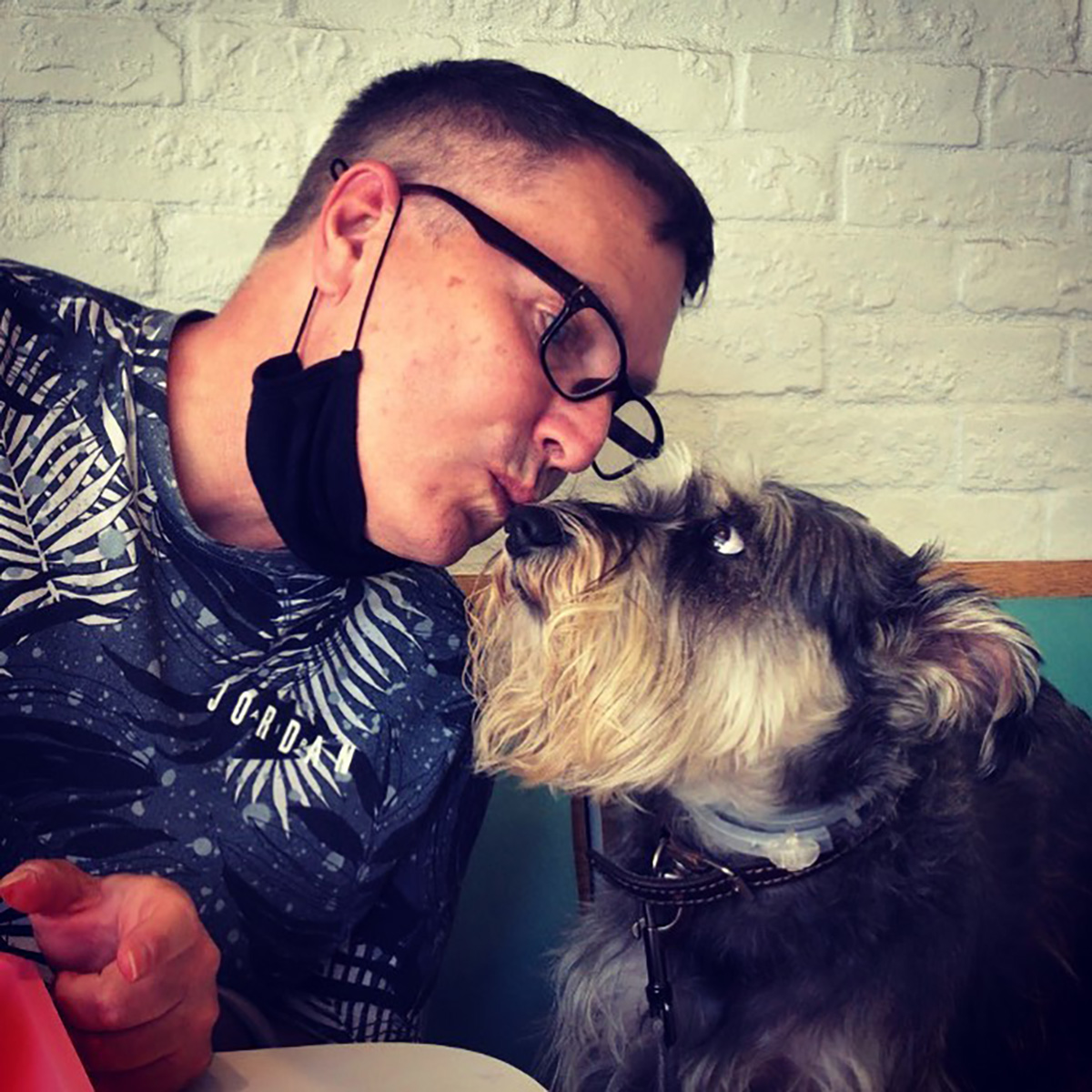
No one yet knows why Troy took his life. We may never know. But Troy and I often shared our deeply disturbing bouts with drowning depression. Waves would inexplicitly come upon us, triggered by sadness or an image or a thought we’d let get mangled in our unresolved, inescapable past trauma.
We survived because we shared our pain without judgment or shame. We may have argued – but in this, we trusted each other. We set everything else aside and respectfully, actively listened to the words and the pain within the words.
Listening, Indian philosopher Krishnamurti once said, is an act of love. And we practiced listening. We sought stories that led to laughter. That was the rope ladder out of the dark rabbit hole with its bottomless pit of bullying and endless suffering. Rung by rung, we’d talk and laugh and gripe about our beloved dogs.
I shared my 12 Step mantra when I got clean and sober: I will not drink, use or kill myself one minute at a time. A suicide survivor, I sought help and I urged him to seek help, too, since I was only a loving friend – and sometimes that’s not enough.
(If you need help, please reach out to talk with someone: call or text 988 Suicide and Crisis Lifeline. They also have services in Spanish and for the deaf.)
In 2015, Troy wrote a personal essay for Gay City News about his idyllic childhood in the 1960s with his sister in Nashville, where his stepfather was a prominent musician. The people he met “taught me a lot about having a mission in life.”
During summers, they went to Dothan, Ala., to hang out with his stepfather’s mother, Granny Alabama. But Troy learned about “adult conversation — often filled with derogatory expletives about Blacks and Jews” and felt “my safety there was fragile.”
It was a harsh revelation. “‘Troy is a queer,’ I overheard my stepfather say with energetic disgust to another family member,” Troy wrote. “Even at 13, I understood that my feelings for other boys were supposed to be secret. Now I knew terror. What my stepfather said humiliated me, sending an icy panic through my body that changed my demeanor and ruined my confidence. For the first time in my life, I felt depression and I became painfully shy. Alabama became a place, not of love, not of shelter, not of the magic of family, but of fear.”
At the public pool, “kids would scream, ‘faggot,’ ‘queer,’ ‘chicken,’ ‘homo,’ as they tried to dunk my head under the water. At one point, a big crowd joined in –– including kids I had known all my life –– and I was terrified they were trying to drown me.
“My depression became dangerous and I remember thinking of ways to hurt myself,” Troy wrote.
But Troy Masters — who left home at 17 and graduated from the University of Tennessee at Knoxville — focused on creating a life that prioritized being of service to his own intersectional LGBTQ people. He also practiced compassion and last August, Troy reached out to his dying stepfather. A 45-minute Facetime farewell turned into a lovefest of forgiveness and reconciliation.
Troy discovered his advocacy chops as an ad representative at the daring gay and lesbian activist publication Outweek from 1989 to 1991.
“We had no idea that hiring him would change someone’s life, its trajectory and create a lifelong commitment” to the LGBTQ press, says Outweek’s co-founder and former editor-in-chief Gabriel Rotello, now a TV producer. “He was great – always a pleasure to work with. He had very little drama – and there was a lot of drama at Outweek. It was a tumultuous time and I tended to hire people because of their activism,” including Michelangelo Signorile, Masha Gessen, and Sarah Pettit.
Rotello speculates that because Troy “knew what he was doing” in a difficult profession, he was determined to launch his own publication when Outweek folded. “I’ve always been very happy it happened that way for Troy,” Rotello says. “It was a cool thing.”
Troy and friends launched NYQ, renamed QW, funded by record producer and ACT UP supporter Bill Chafin. QW (QueerWeek) was the first glossy gay and lesbian magazine published in New York City featuring news, culture, and events. It lasted for 18 months until Chafin died of AIDS in 1992 at age 35.
The horrific Second Wave of AIDS was peaking in 1992 but New Yorkers had no gay news source to provide reliable information at the epicenter of the epidemic.
“When my business partner died of AIDS and I had to close shop, I was left hopeless and severely depressed while the epidemic raged around me. I was barely functioning,” Troy told VoyageLA in 2018. “But one day, a friend in Moscow, Masha Gessen, urged me to get off my back and get busy; New York’s LGBT community was suffering an urgent health care crisis, fighting for basic legal rights and against an increase in violence. That, she said, was not nothing and I needed to get back in the game.”
It took Troy about two years to launch the bi-weekly newspaper LGNY (Lesbian and Gay New York) out of his East Village apartment. The newspaper ran from 1994 to 2002 when it was re-launched as Gay City News with Paul Schindler as co-founder and Troy’s editor-in-chief for 20 years.

“We were always in total agreement that the work we were doing was important and that any story we delved into had to be done right,” Schindler wrote in Gay City News.
Though the two “sometimes famously crossed swords,” Troy’s sudden death has special meaning for Schindler. “I will always remember Troy’s sweetness and gentleness. Five days before his death, he texted me birthday wishes with the tag, ‘I hope you get a meaningful spanking today.’ That devilishness stays with me.”
Troy had “very high EI (Emotional Intelligence), Schindler says in a phone call. “He had so much insight into me. It was something he had about a lot of people – what kind of person they were; what they were really saying.”
Troy was also very mischievous. Schindler recounts a time when the two met a very important person in the newspaper business and Troy said something provocative. “I held my breath,” Schindler says. “But it worked. It was an icebreaker. He had the ability to connect quickly.”
The journalistic standard at LGNY and Gay City News was not a question of “objectivity” but fairness. “We’re pro-gay,” Schindler says, quoting Andy Humm. “Our reporting is clear advocacy yet I think we were viewed in New York as an honest broker.”
Schindler thinks Troy’s move to Los Angeles to jump-start his entrepreneurial spirit and reconnect with Arturo, who was already in L.A., was risky. “He was over 50,” Schindler says. “I was surprised and disappointed to lose a colleague – but he was always surprising.”
“In many ways, crossing the continent and starting a print newspaper venture in this digitally obsessed era was a high-wire, counter-intuitive decision,” Troy told VoyageLA. “But I have been relentlessly determined and absolutely confident that my decades of experience make me uniquely positioned to do this.”
Troy launched The Pride L.A. as part of the Mirror Media Group, which publishes the Santa Monica Mirror and other Westside community papers. But on June 12, 2016, the day of the Pulse Nightclub shooting in Orlando, Fla., Troy said he found MAGA paraphernalia in a partner’s office. He immediately plotted his exit. On March 10, 2017, Troy and the “internationally respected” Washington Blade announced the launch of the Los Angeles Blade.

In a March 23, 2017 commentary promising a commitment to journalistic excellence, Troy wrote: “We are living in a paradigm shifting moment in real time. You can feel it. Sometimes it’s overwhelming. Sometimes it’s toxic. Sometimes it’s perplexing, even terrifying. On the other hand, sometimes it’s just downright exhilarating. This moment is a profound opportunity to reexamine our roots and jumpstart our passion for full equality.”
Troy tried hard to keep that commitment, including writing a personal essay to illustrate that LGBTQ people are part of the #MeToo movement. In “Ending a Long Silence,” Troy wrote about being raped at 14 or 15 by an Amtrak employee on “The Floridian” traveling from Dothan, Ala., to Nashville.
“What I thought was innocent and flirtatious affection quickly turned sexual and into a full-fledged rape,” Troy wrote. “I panicked as he undressed me, unable to yell out and frozen by fear. I was falling into a deepening shame that was almost like a dissociation, something I found myself doing in moments of childhood stress from that moment on. Occasionally, even now.”
From the personal to the political, Troy Masters tried to inform and inspire LGBTQ people.
Richard Zaldivar, founder and executive director of The Wall Las Memorias Project, enjoyed seeing Troy at President Biden’s Pride party at the White House.
“Just recently he invited us to participate with the LA Blade and other partners to support the LGBTQ forum on Asylum Seekers and Immigrants. He cared about underserved community. He explored LGBTQ who were ignored and forgotten. He wanted to end HIV; help support people living with HIV but most of all, he fought for justice,” Zaldivar says. “I am saddened by his loss. His voice will never be forgotten. We will remember him as an unsung hero. May he rest in peace in the hands of God.”
Troy often featured Bamby Salcedo, founder, president/CEO of TransLatina Coalition, and scores of other trans folks. In 2018, Bamby and Maria Roman graced the cover of the Transgender Rock the Vote edition.
“It pains me to know that my dear, beautiful and amazing friend Troy is no longer with us … He always gave me and many people light,” Salcedo says. “I know that we are living in dark times right now and we need to understand that our ancestors and transcestors are the one who are going to walk us through these dark times… See you on the other side, my dear and beautiful sibling in the struggle, Troy Masters.”
“Troy was immensely committed to covering stories from the LGBTQ community. Following his move to Los Angeles from New York, he became dedicated to featuring news from the City of West Hollywood in the Los Angeles Blade and we worked with him for many years,” says Joshua Schare, director of Communications for the City of West Hollywood, who knew Troy for 30 years, starting in 1994 as a college intern at OUT Magazine.
“Like so many of us at the City of West Hollywood and in the region’s LGBTQ community, I will miss him and his day-to-day impact on our community.”

(Photo by Richard Settle for the City of West Hollywood)
“Troy Masters was a visionary, mentor, and advocate; however, the title I most associated with him was friend,” says West Hollywood Mayor John Erickson. “Troy was always a sense of light and working to bring awareness to issues and causes larger than himself. He was an advocate for so many and for me personally, not having him in the world makes it a little less bright. Rest in Power, Troy. We will continue to cause good trouble on your behalf.”
Erickson adjourned the WeHo City Council meeting on Monday in his memory.
Masters launched the Los Angeles Blade with his partners from the Washington Blade, Lynne Brown, Kevin Naff, and Brian Pitts, in 2017.

“Troy’s reputation in New York was well known and respected and we were so excited to start this new venture with him,” says Naff. “His passion and dedication to queer LA will be missed by so many. We will carry on the important work of the Los Angeles Blade — it’s part of his legacy and what he would want.”
AIDS Healthcare Foundation President Michael Weinstein, who collaborated with Troy on many projects, says he was “a champion of many things that are near and dear to our heart,” including “being in the forefront of alerting the community to the dangers of Mpox.”
“All of who he was creates a void that we all must try to fill,” Weinstein says. “His death by suicide reminds us that despite the many gains we have made, we’re not all right a lot of the time. The wounds that LGBT people have experienced throughout our lives are yet to be healed even as we face the political storm clouds ahead that will place even greater burdens on our psyches.”
May the memory and legacy of Troy Masters be a blessing.
Veteran LGBTQ journalist Karen Ocamb served as the news editor and reporter for the Los Angeles Blade.
Miscellaneous
Los Angeles Blade publisher Troy Masters dies at 63
Longtime advocate for LGBTQ equality, queer journalism
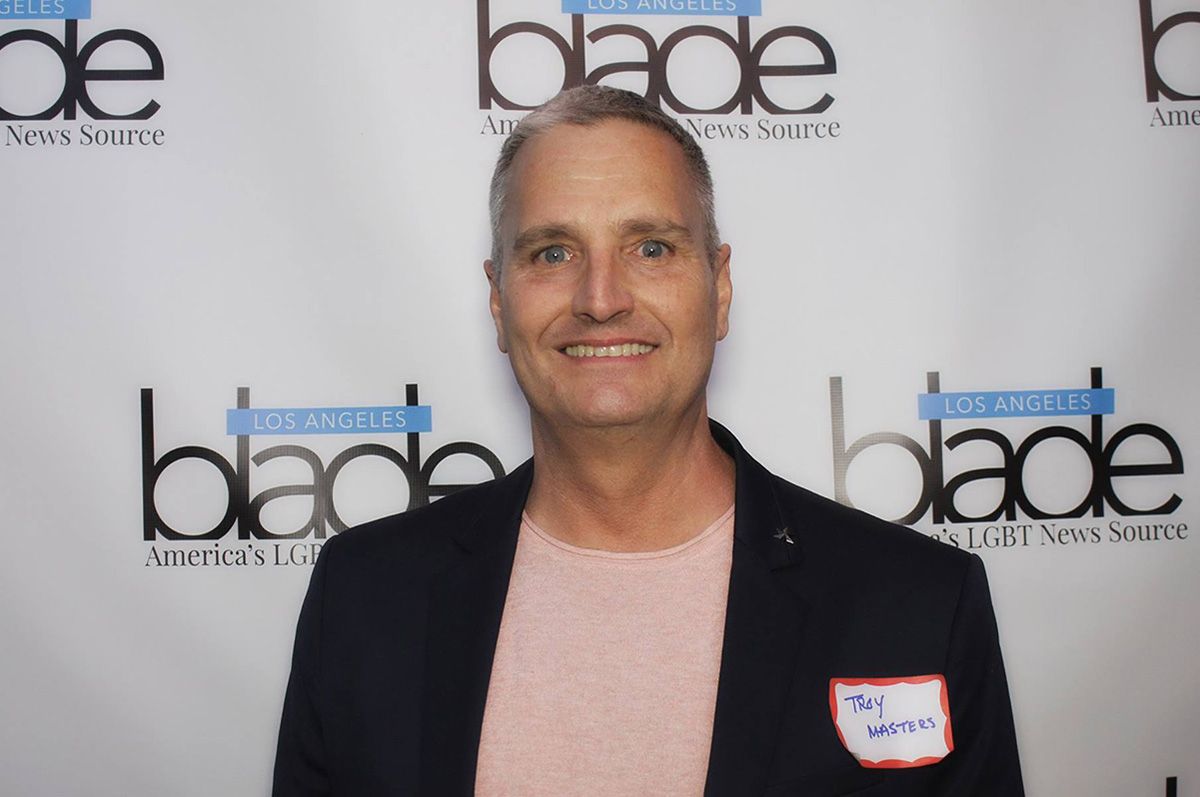
Troy Masters, publisher of the Los Angeles Blade, died unexpectedly on Wednesday Dec. 11, according to a family member. He was 63. The cause of death was not immediately released.
Masters is a well-respected and award-winning journalist and publisher with decades of experience, mostly in LGBTQ media. He founded Gay City News in New York City in 2002 and relocated to Los Angeles in 2015. In 2017, he became the founding publisher of the Los Angeles Blade, a sister publication of the Washington Blade, the nation’s oldest LGBTQ newspaper.
His family released a statement to the Blade on Thursday.
“We are shocked and devastated by the loss of Troy,” the statement says. “He was a tireless advocate for the LGBTQ community and leaves a tremendous legacy of fighting for social justice and equality. We ask for your prayers and for privacy as we mourn this unthinkable loss. We will announce details of a celebration of life in the near future.”
The Blade management team released the following statement on Thursday:
“All of us at the Los Angeles Blade and Washington Blade are heartbroken by the loss of our colleague. Troy Masters is a pioneer who championed LGBTQ rights as well as best-in-class journalism for our community. We will miss his passion and his tireless dedication to the Los Angeles queer community.
“We would like to thank the readers, advertisers, and supporters of the Los Angeles Blade, which will continue under the leadership of our local editor Gisselle Palomera, the entire Blade family in D.C. and L.A., and eventually under a new publisher.”
Troy Masters was born April 13, 1961 and is survived by his mother Josie Kirkland and his sister Tammy Masters, along with many friends and colleagues across the country. This is a developing story and will be updated as more details emerge.

-

 District of Columbia4 days ago
District of Columbia4 days agoTwo pioneering gay journalists to speak at Thursday event
-

 Colombia4 days ago
Colombia4 days agoBlade travels to Colombia after U.S. forces seize Maduro in Venezuela
-

 a&e features4 days ago
a&e features4 days agoQueer highlights of the 2026 Critics Choice Awards: Aunt Gladys, that ‘Heated Rivalry’ shoutout and more
-

 Minnesota4 days ago
Minnesota4 days agoTim Walz drops out of Minn. governor’s race

















